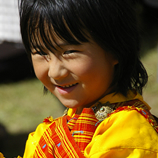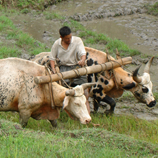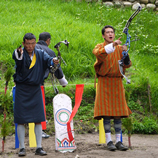


Bhutan's population comprises three main ethnic groups: Sharchop, Ngalongs, and Lhotshampa. Sharchop are the oldest ethnic group in the country and are considered to be some of the earliest inhabitants of the South Asian region. Bhutan has a rich cultural heritage, and despite modernization, the country has been able to preserve its culture due to historical isolation, making it a major point of attraction. The government prioritizes cultural preservation and the happiness of its citizens over anything else, which has helped the country stand out from others.
Art and crafts have been an integral part of Bhutanese tradition for a long time, offering tourists a glimpse into the past. From wall paintings, thangkas, and sculptures, the majority of the arts are connected to religious beliefs and spirituality. The country is well known for its handmade art, which can be bought in local market shops as souvenirs.
Rice and maize are staple foods. The diet includes chicken, yak, cow, and sheep. Chili with cheese is a popular dish. Beverages include butter tea, rice wine, and beer.
Archery is the national sport, with regular competitions. Darts is another popular outdoor sport that can be witnessed in various regions.

Tradition is deeply ingrained in Bhutanese culture, evident in clothing and architecture. Gho for men and Kira for women are the traditional dress for local citizens and are mandatory for everyone. The fabrics used in these clothes may range from simple cotton to intricate silk designs. Festivals are one of the best times to explore the country, as people in their cultural attire sing and dance to folk music, creating an energetic environment.
Inheritance is matrilineal, with daughters inheriting the family home. Love marriages are common; arranged marriages are rare, and while uncommon, polygamy and polyandry are accepted.

King Jigme Singye Wangchuck's emphasis on "Gross National Happiness" (GNH) over Gross National Product (GNP) reflects Bhutan's commitment to a culturally appropriate economy based on Buddhist values. The development of the country depends on the level of happiness of the locals. The country has also established eight different additions to the Gross National Happiness Index that allow the government to determine the status of happiness.